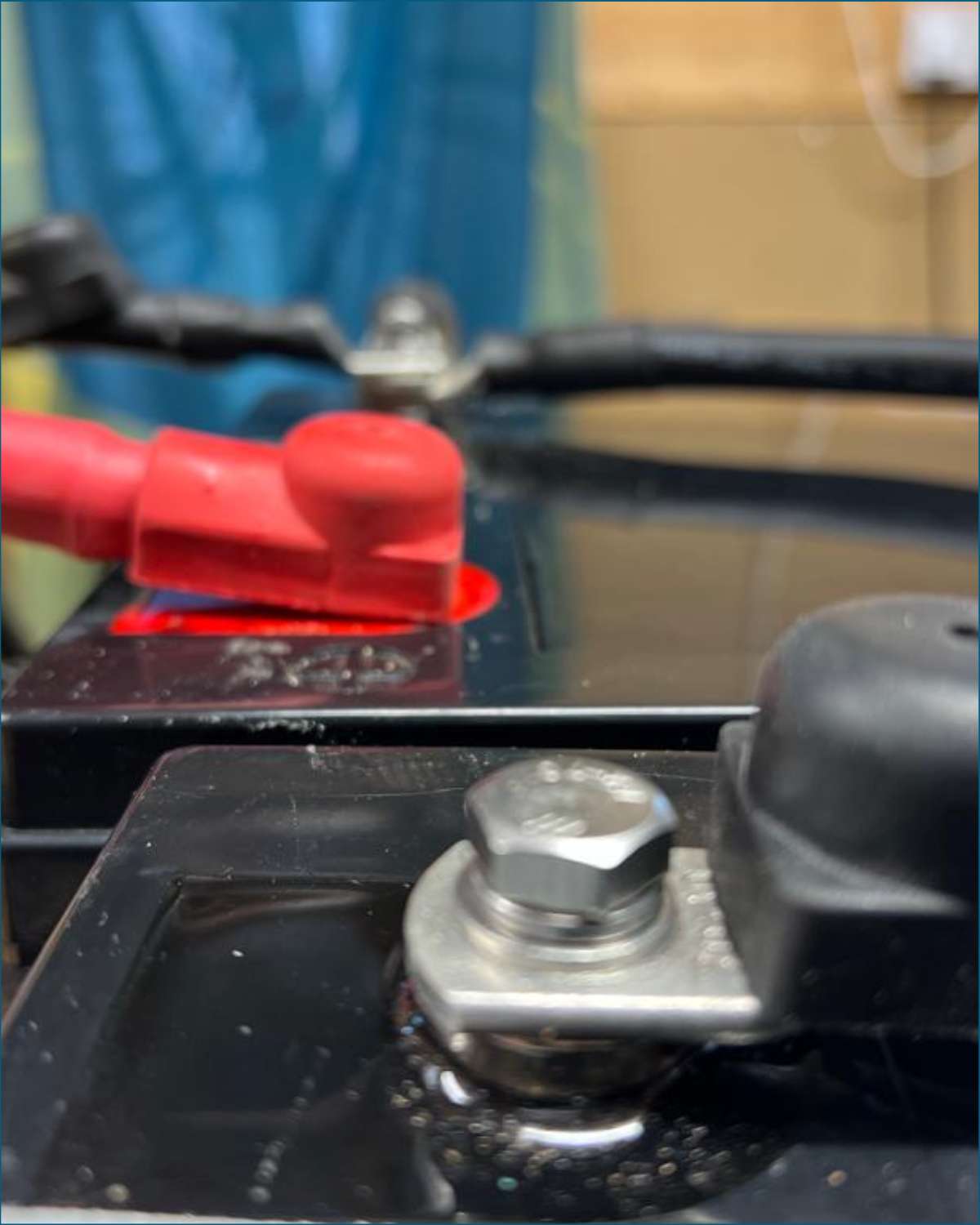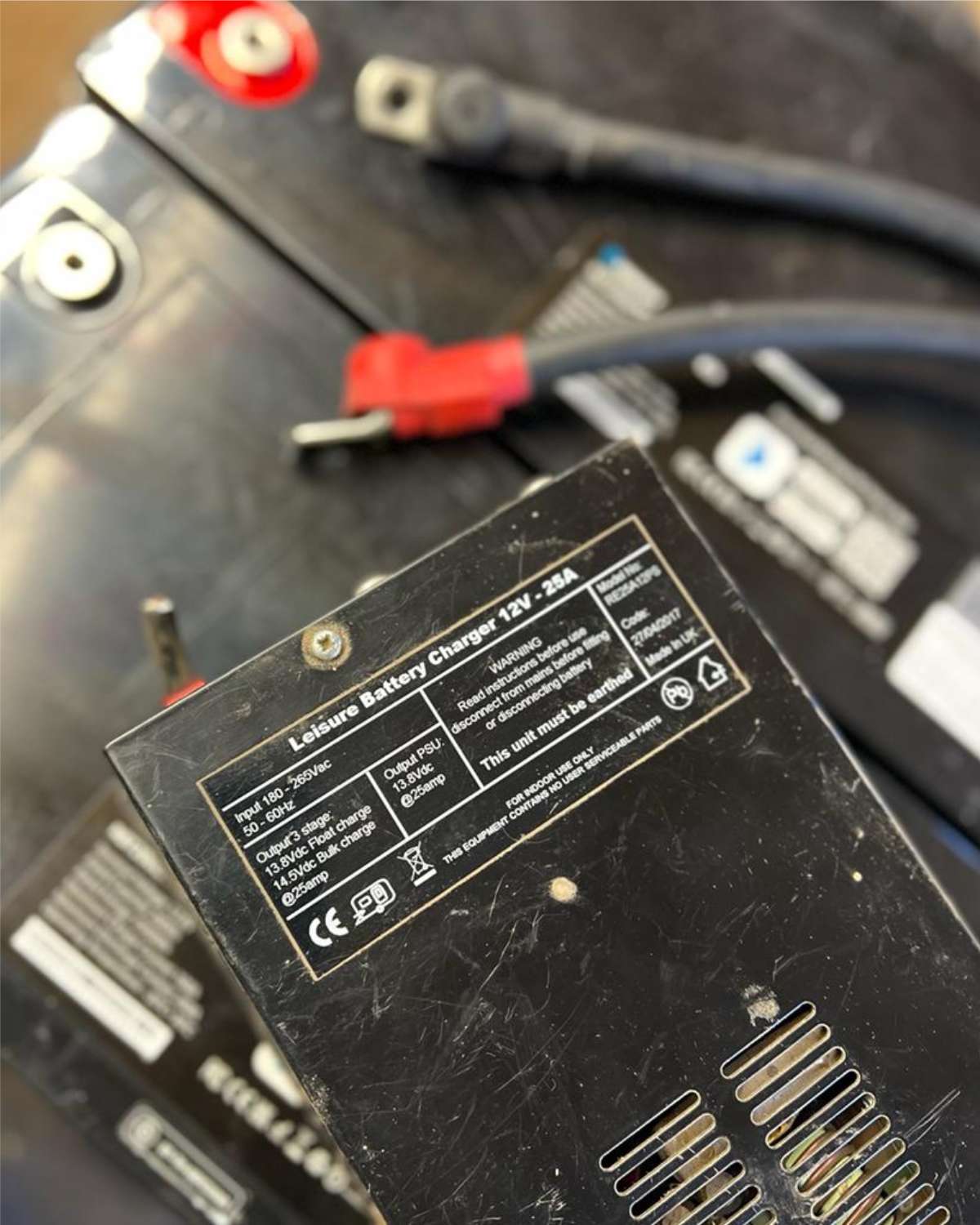AGM vs Lithium Battery: Unravel the mystery with our comprehensive guide. Discover which battery is the best fit for your RV or camper van needs.
Every RVer understands the importance of a reliable power source. It’s what keeps your lights on, your fridge running, and ensures that your adventures continue smoothly.
In the world of RVing, the battery system you choose can significantly impact your travel experience.
But with so many options out there – AGM and Lithium being the most popular ones – deciding which battery type to install in your RV can feel like navigating a complex maze.
Lithium batteries have been all the rage lately, touted for their efficiency and longevity.
But does that mean they’re the best choice for everyone? Not necessarily.
AGM batteries, while perhaps less glamorous, still hold their ground in certain scenarios and might just be the perfect fit depending on your specific needs and circumstances.
In this blog post, we’ll dive deep into the world of AGM and Lithium batteries, comparing their pros and cons, and helping you make an informed decision for your RV.
Because at the end of the day, your choice of battery can make the difference between an epic adventure and a roadside inconvenience.
So buckle up and get ready to supercharge your RVing knowledge. Let’s power up this journey of discovery together!
At a Glance: AGM vs Lithium Battery Comparison Table
| Features | AGM | Lithium |
|---|---|---|
| Depth of discharge (DOD) | 50% | 80-100% |
| Operating Temp | 32~122°F/ 0~50°C | 32~131°F/ 0~55°C |
| Charging speed | Fast to 80% | Fast to 100% |
| Performance | Ok | Excellent |
| Usable capacity | 50% | 80-100% |
| Weight & Size | Heavy & Big | Light & Smaller |
| Cost | $$ | $$$ |
Understanding RV Batteries
Before we delve into the specifics of AGM and lithium batteries, let’s take a moment to understand the role of batteries in your RV.
An RV battery is more than just a power source; it’s the heart of your mobile home that keeps everything running smoothly.
RV batteries are responsible for powering all the electrical components in your RV – from essential appliances like your refrigerator, air conditioner, and water heater, to your lights, fans, and entertainment systems.
When you’re boondocking, far from electrical hookups at campgrounds or RV parks, your RV battery becomes your primary power source.
There are two types of electrical systems in an RV – the 12-volt DC system and the 120-volt AC system.
The 12-volt system is powered directly by your RV battery and runs most of your basic appliances like lights and water pump.
The 120-volt system, on the other hand, is used for larger appliances like your air conditioner and microwave, and typically relies on a power hookup or a generator.
However, with the help of an inverter, your battery can also power these larger appliances if needed.
Now, let’s turn our attention to the two types of batteries you’re likely considering for your RV – AGM and Lithium.
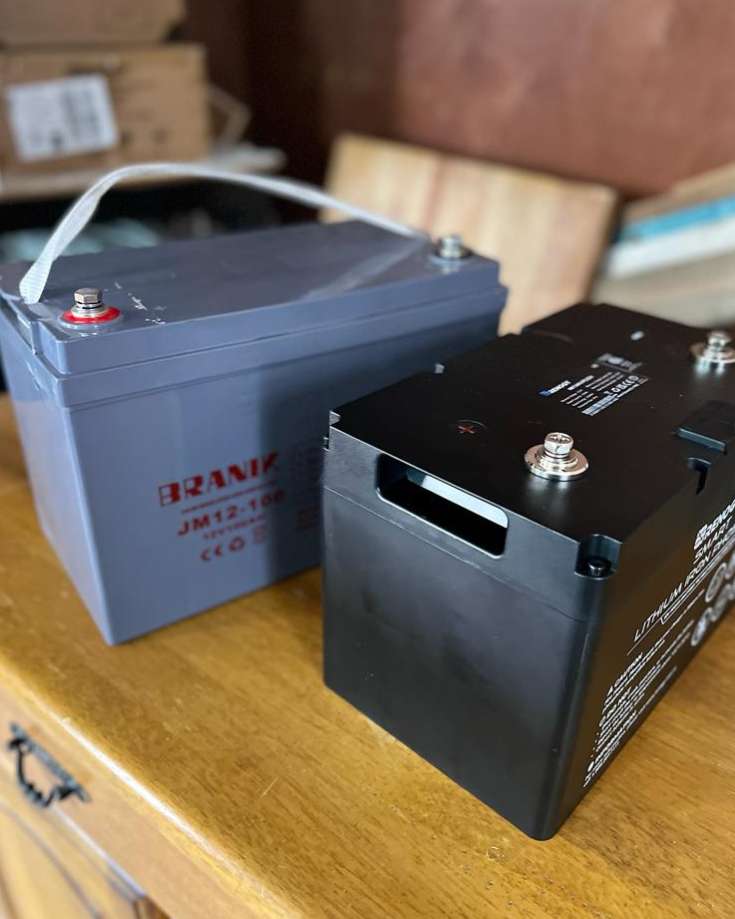
What are AGM Batteries?
AGM, or Absorbent Glass Mat batteries, have been a reliable choice for RVers for many years.
These batteries use a unique design where the electrolyte is absorbed into fiberglass mats placed between the battery plates.
This design makes them spill-proof and maintenance-free, which is a significant advantage over the traditional lead acid batteries of old.
AGM batteries are known for their durability and ability to withstand repeated draining and recharging cycles.
They also charge relatively quickly and have a low self-discharge rate, meaning they won’t lose much charge when not in use.
We used an AGM deep cycle battery bank for many years without too many issues. But once we were living in our camper full-time, we used and cycled them heavily.
That meant they didn’t last much more than 2 years so needed replacing relatively often.
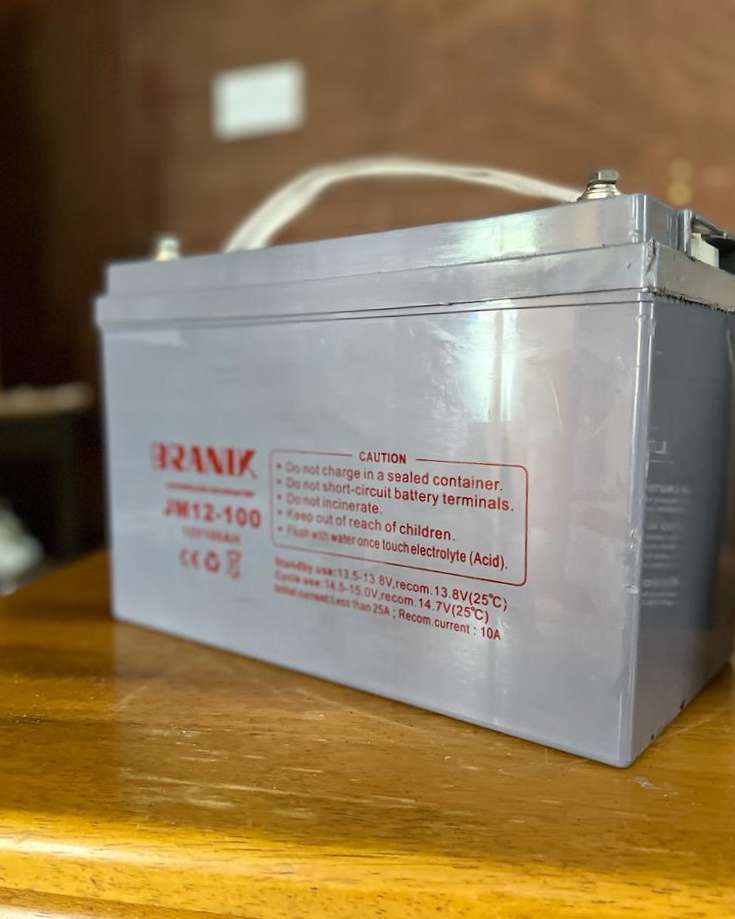
What are Lithium Batteries?
On the other side of the spectrum, we have lithium batteries, specifically lithium-ion batteries.
These batteries have gained popularity in recent years due to their high efficiency and longevity.
Unlike AGM batteries, lithium batteries can be fully discharged and they can handle hundreds more charge cycles.
Plus, they can charge far faster than their AGM counterparts – a massive advantage on the road.
They’re also lighter and more compact, making them a great choice if you’re concerned about weight and space in your camper.
While everyone’s talking about these batteries today, they still have a high upfront cost.
6 years ago when we built our camper, they didn’t make financial sense. We used the money to travel rather than sit in shiny lithium batteries.
Times have changed though and the cost of lithium batteries has fallen significantly, making them a more financially viable option.
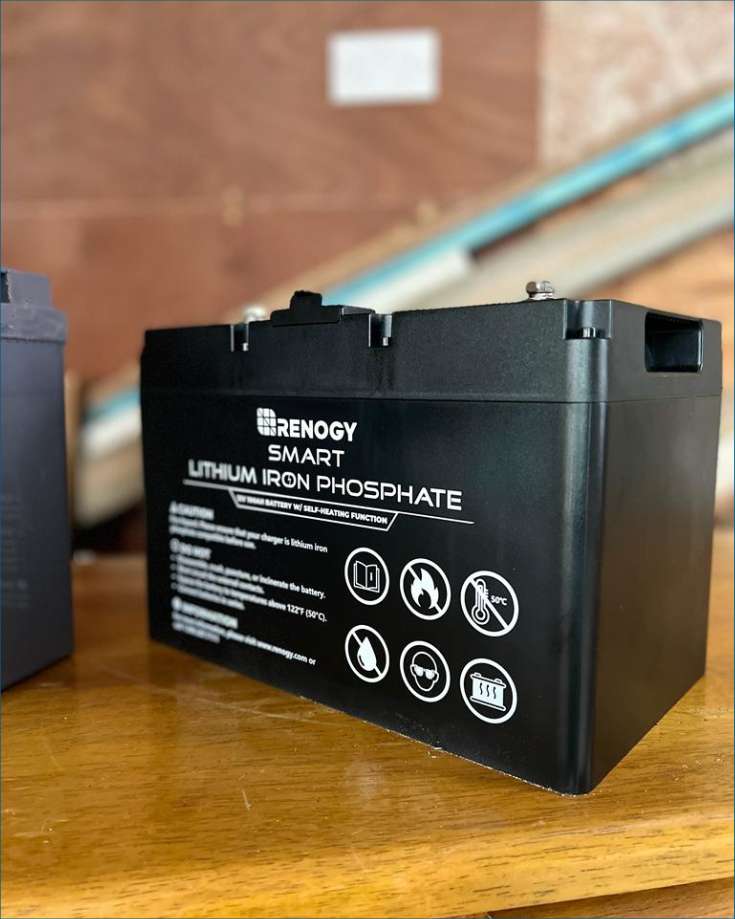
AGM vs. Lithium Batteries: A Detailed Comparison
Understanding the differences between AGM and Lithium batteries is crucial in deciding which one is the right fit for your RV.
To make this comparison easier, we’ll break it down into several key factors that most directly impact an RVer’s experience.
These include:
- lifespan,
- performance,
- maintenance,
- safety, and
- cost.
For each factor, we’ll provide a ‘winner’ or ‘tie’ verdict.
This will give you a quick overview, but be sure to read the details to fully understand the nuances and make the best decision for your specific needs.
Lifespan
- AGM: Generally lasts 3-7 years depending on usage and maintenance.
- Lithium: Can last up to 10 years or more with proper care.
- Verdict: Lithium is the clear winner when it comes to lifespan.
Lithium batteries generally have a longer lifespan than AGM lead acid batteries, often by several years. This does makes them a cost-effective choice in the long run.
Several factors can impact the lifespan of both AGM and Lithium batteries in an RV or campervan:
Depth of Discharge (DoD)
This refers to the percentage of the battery’s energy that has been discharged relative to the overall capacity.
- AGM: AGM batteries typically have a lower DoD. Frequently discharging them beyond 50% can significantly shorten their lifespan.
- Lithium: Lithium batteries, on the other hand, can handle higher DoD, often up to 80-100%. This means you can use more of a Lithium battery’s power without harming its lifespan.
Temperature
Batteries can be sensitive to extreme temperatures.
- AGMs, while resistant to colder conditions, can have their lifespan shortened by constant exposure to high heat.
- Lithiums are generally more heat-tolerant but perform poorly in freezing conditions.
Charging Practices
Overcharging or undercharging can harm both types of batteries.
- AGMs prefer slow, steady charging and should not be overcharged.
- Lithiums require specific chargers or a battery management system to prevent overcharging and to ensure optimal performance.
Storage Conditions
Storage conditions can influence the lifespan and performance of your RV batteries. The main factors to consider are temperature, state of charge, and storage duration.
- Temperature – for long-term storage, a moderate, stable temperature is ideal for both types of batteries.
- State of Charge
- AGM: If you’re storing an AGM battery for an extended period, it’s best to store it fully charged. A discharged AGM battery left sitting can suffer from sulfation, which can drastically shorten its lifespan.
- Lithium: High quality lithium batteries have a lower self-discharge rate, so they can be stored for longer periods without needing a recharge. However, for optimal health, it’s recommended to store them at around 40% charge.
- Storage Duration
- AGM: While AGM lead acid batteries can handle being stored for a few months, they should be checked and recharged regularly (around every 3-6 months) to prevent irreversible discharge.
- Lithium: Thanks to their low self-discharge rate, most lithium batteries can be stored for longer periods (up to a year in some cases) without significant capacity loss. But it’s still a good idea to check on them periodically. Some batteries have a sleep mode and need to be connected to the correct charger to awake them.
Performance and Operational Use
- AGM: Durable and reliable, but performance can decline over time and in extreme temperatures.
- Lithium: Consistent power output throughout their charge cycle and better performance in a wide range of temperatures.
- Verdict: Lithium takes the lead in performance.
When you’re out on the road in your RV, the last thing you want is battery trouble. So let’s compare how AGM and Lithium batteries perform under typical RV use conditions.
Power Output
- AGMs deliver solid performance, but their power output can decrease as the battery discharges. This means that your appliances may not run as effectively when the battery’s charge goes down.
- Lithiums provide a consistent power output throughout their charge cycle. This means your RV appliances will operate at their best, whether the battery is fully charged or almost discharged.
Charging Speed
- AGMs typically charge slower than lithium batteries. They also become more resistant to charging as they reach full capacity, which can extend the charging time.
- Lithiums can accept a higher charge current, meaning they can recharge faster. This can be particularly useful for RVers who rely on solar panels or short generator runs for charging.
Usable Capacity
- AGMs: it’s generally recommended not to deplete beyond 50% of the total capacity to prevent damage and maintain a longer lifespan. This effectively halves the usable capacity of the battery.
- Lithium: Lithium batteries allow for a greater depth of discharge, often up to 80-100%. This means you get to use almost all of the battery’s rated capacity.
Weight and Size
- AGMs are heavier and larger than lithium batteries of equivalent capacity. This might be a consideration if you’re conscious about the weight and space in your RV.
- Lithiums are lighter and more compact, allowing you to save on space and weight – a valuable advantage when every inch and pound counts in your RV.
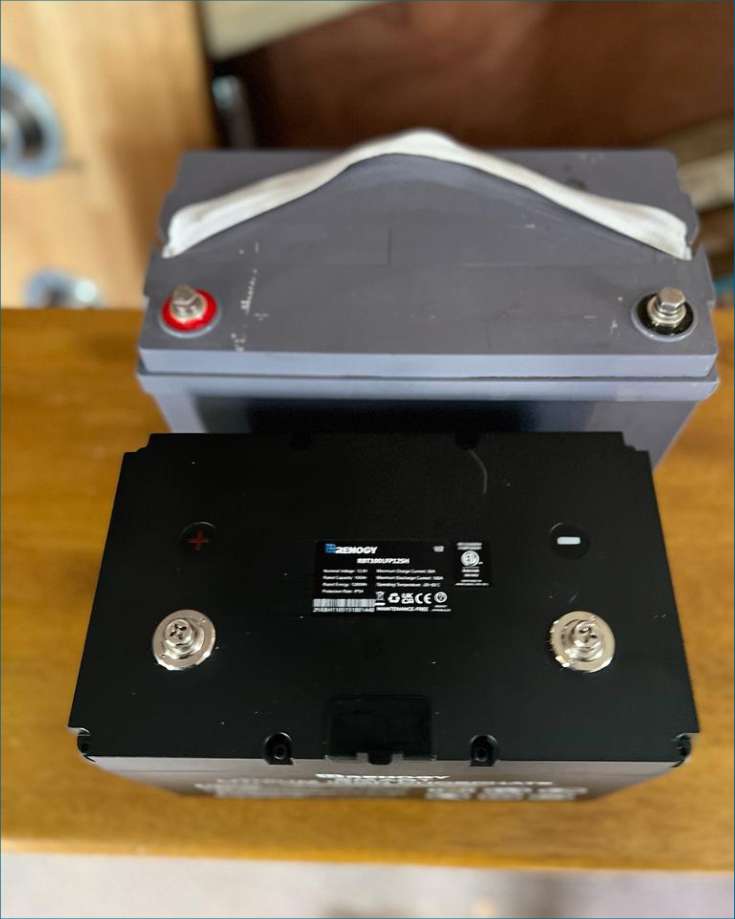
Safety
- AGM: Safe, as they are sealed and do not leak. However, they can get damaged by overcharging.
- Lithium: Also safe, with built-in safeguards against overcharging and discharging. However, they require a Battery Management System (BMS) to maintain these safeguards.
- Verdict: Another tie. Both batteries have their safety measures, but also their unique considerations.
Safety is a paramount concern when choosing your RV battery. Both AGM and Lithium batteries have their safety features, as well as points to consider.
Risk of Leakage
- AGMs are sealed and designed not to leak, even if the case is broken. This makes them safe for use in various positions and locations within your RV.
- Lithium batteries are also sealed and don’t pose a risk of acid leakage.
Overcharging & Overdischarging
- AGM: Overcharging can be harmful to AGM batteries, leading to water loss and potential damage. Using a smart charger that can automatically switch to a maintenance or ‘float’ mode when the battery is fully charged can help prevent this.
- Lithium batteries have built-in safeguards against overcharging and over-discharging. However, they require a Battery Management System (BMS) to maintain these safeguards. They also require a specific charger with a very different charging profile to the AGM.
Thermal Runaway
- AGMs are less likely to experience thermal runaway (a rapid, uncontrolled increase in temperature leading to a fire or explosion) due to their lower energy density and slower charge/discharge rates.
- Lithium: Certain types, particularly those using Lithium Cobalt Oxide (LiCoO2) chemistry, have been known to suffer from thermal runaway. However, most RV lithium batteries use Lithium Iron Phosphate (LiFePO4) chemistry, which is more stable and much less prone to thermal runaway.
Gassing
- AGM: When overcharged, AGM batteries can emit hydrogen gas, which is flammable. However, under normal operating conditions, this risk is minimal.
- Lithiums don’t produce gas during charging or discharging.
Cost
- AGM: Lower upfront cost.
- Lithium: Higher upfront cost, but may offer more value over time due to better lifespan and efficiency.
- Verdict: If upfront cost is your primary concern, AGM is the winner. But if you’re looking at long-term value, Lithium might edge out.
Upfront, AGM batteries are typically cheaper than lithium batteries.
However, considering the lifespan and efficiency, lithium batteries may offer better value over time.
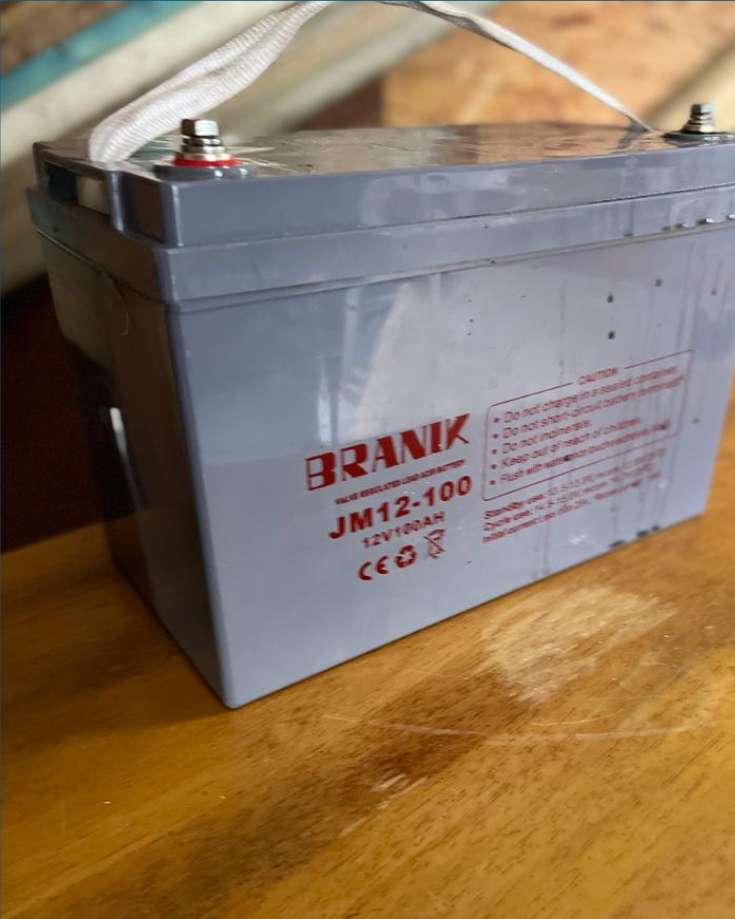
The Long-Term Cost Factor: Is Lithium Worth the Investment for You?
While the long-term cost-effectiveness of lithium batteries is a significant selling point, it might not hold as much weight for everyone.
Let’s put it in perspective.
Imagine you’re planning a cross-country adventure in your RV.
You’ve got your route mapped out, destinations pinned, and excitement brewing.
You’re ready to invest in a high-quality battery that will last you through this grand expedition and many more to come.
In this case, the higher upfront cost of a lithium battery might seem like a worthy investment, considering its superior lifespan and performance attributes.
But what if you’re an occasional RVer who enjoys weekend getaways or short-term road trips? Or perhaps you’re not sure how long you’ll keep your current RV before upgrading or downsizing.
In these scenarios, the higher initial cost of a lithium battery may not justify the potential long-term savings, especially if you won’t own the RV long enough to recoup the investment.
Investing in an RV battery isn’t just about comparing features and prices; it’s about evaluating your RV lifestyle, your future plans, and your individual needs.
What works for a full-time RVer might not make sense for a casual vacationer, and vice versa.
Remember, there’s no one-size-fits-all answer here.
It’s all about finding the right balance between performance, cost, and your personal RVing journey. So take a moment to reflect on your RVing habits and plans.
After all, the road to making the best decision begins with understanding your own needs.
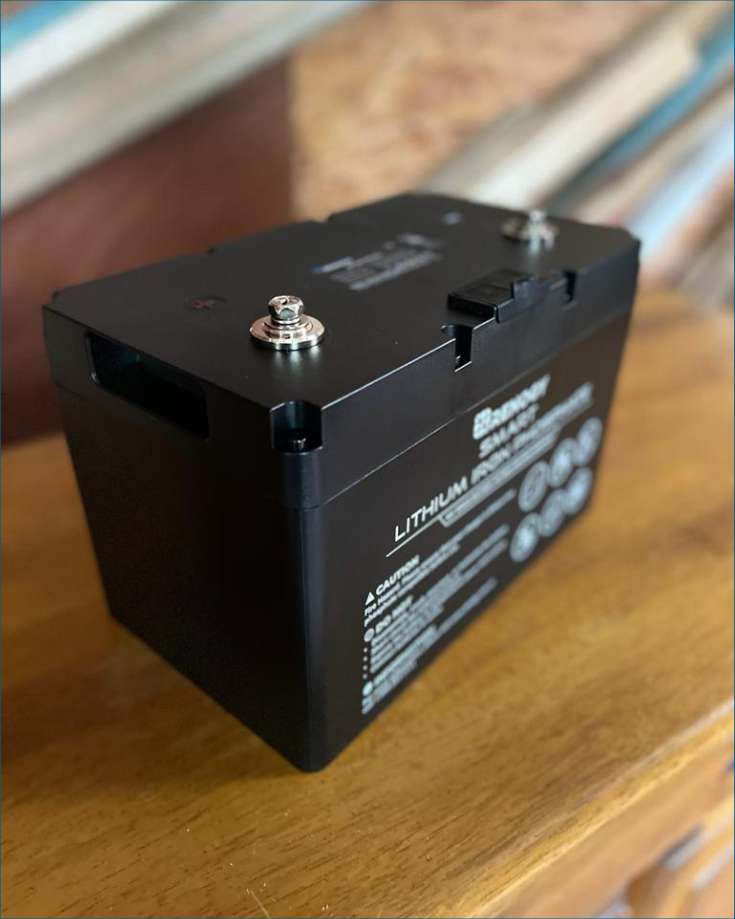
The Ups and Downs of Using Lithium Batteries in Your RV
When it comes to powering your RV, lithium batteries are a bit like the star quarterback.
They’ve got a lot of hype, impressive stats, and can definitely perform under pressure.
But, just like any player, they’ve got their strengths and their weaknesses.
Let’s huddle up and talk about the game plan.
Advantages of Lithium Batteries
- Endurance Training: Lithium batteries offer a higher number of charge cycles compared to traditional AGM batteries. Think of them like a long-distance runner – they’re built for the long haul.
- Power Play: These batteries provide a consistent power output, meaning your appliances work at their best, whether the battery is fully charged or almost empty. It’s like having a steady flow of energy right up to the finish line.
- Quick Recovery: Lithium batteries can recharge faster than their AGM counterparts. So, if you’re relying on solar panels or a generator, these batteries get back in the game quicker.
- Light on Their Feet: Because of their higher energy density, they are lighter and more compact than AGM batteries – a real bonus when you’re trying to keep the weight down in your RV.
But, as in any game, there are always challenges to consider.
Disadvantages of Lithium Batteries
- Pricey Player: The most significant disadvantage of lithiums is their upfront cost. They’re like the high-priced star player of your team. Yes, they perform great, but boy, do you pay for it!
- Cold Weather Weakness: Charging in extremely cold conditions can harm them. It’s like trying to play a summer sport in the middle of winter – not ideal. In reality though, by installing the batteries in a warm position in your RV, you can avoid this issue.
- Special Charger Needed: not all chargers are lithium compatible so watch out!
- Limited Battery Bank Voltage: You can wire lithium batteries in parallel to boost their ah capacity. However, unlike AGM batteries, most lithium batteries can’t be wired in series to increase the battery bank voltage. So, if you’re eyeing a 24v setup or higher, it’s crucial to double-check with the manufacturer. Can their batteries be connected in series? If not, you’ll need to shift gears and find a battery that comes out of the box with the voltage setting you’re after.
The Pros and Cons of Using AGM Batteries in Your RV
Think of AGM lead acid batteries as the trusty old-timers of the battery world.
They’ve been used in RVs for decades, earning a reputation for reliability and ease of use.
But just like anything, they come with their own set of strengths and weaknesses.
Let’s explore.
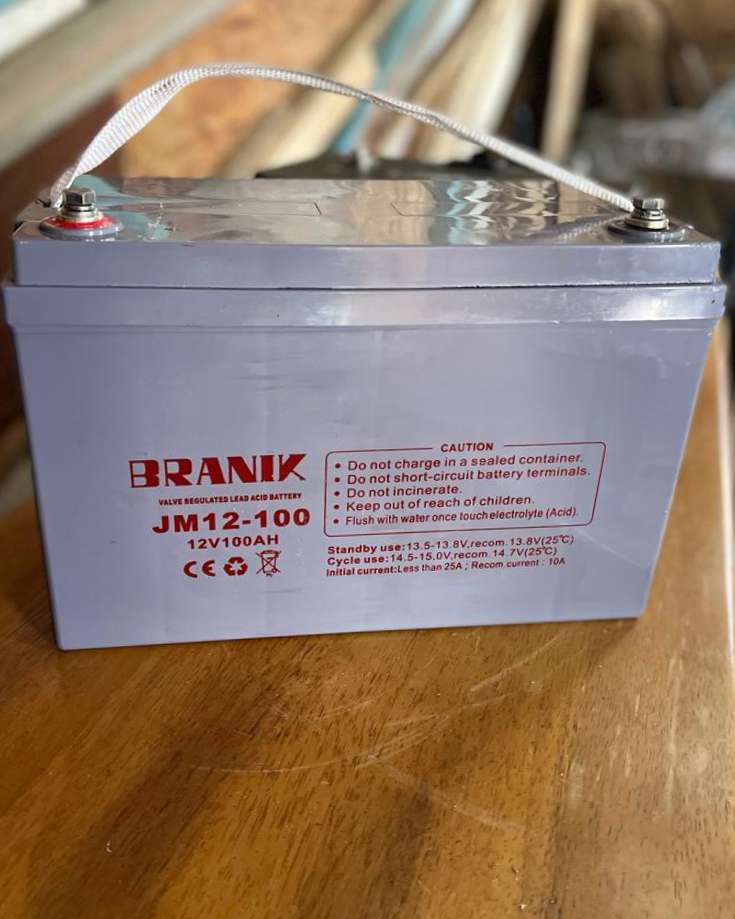
Advantages of AGM Batteries
- Reliability: AGM batteries are like that dependable old car in your garage that starts up every time, no fuss. They’ve been around for a while and have proven their worth in countless RV adventures.
- Maintenance-Free: One of the best things about AGM batteries is that they require little to no maintenance. It’s like having a self-cleaning oven – you can just set it and forget it!
- Leak-Proof: AGM batteries are sealed and won’t leak acid, even if the case is broken. That’s a peace of mind you’ll appreciate when you’re miles from nowhere in your RV.
- Versatility: Thanks to their design, AGM batteries can be installed in various positions without worrying about leaks. It’s like having a Swiss Army Knife in your toolkit – handy in any situation.
- Easy to upscale. Unlike their lithium counterpart, AGMs can generally be linked together in parallel and in series too. So, not only can you have a large battery bank, you can also combine the batteries to make 24v, 36v 48v or even 60v if your set up works that way.
But, as with any seasoned veteran, there are a few drawbacks to consider.
Disadvantages of AGM Batteries
- Limited Depth of Discharge: With AGM batteries, it’s generally recommended not to deplete beyond 50% of their capacity to prevent damage. It’s a bit like an old athlete who needs to conserve energy for the long game.
- Slower Charging: Compared to lithium batteries, AGM batteries take longer to recharge. It’s like waiting for your favorite TV show to buffer – it’ll get there eventually, but you need a little patience.
- Size and Weight: AGM batteries are typically larger and heavier than lithium batteries. It’s like comparing a heavyweight boxer to a featherweight – both pack a punch, but one takes up a bit more space in the ring.
- Shorter Lifespan: AGM batteries generally don’t last as long as lithium batteries. It’s like a favorite pair of hiking boots – comfortable and reliable, but they won’t last forever.
Concluding Thoughts and Your Next Steps
There you have it – a head-to-head comparison of lithium and AGM lead acid batteries for your RV.
Whether you’re vying for the high-performing star player that is the lithium battery or the seasoned, reliable AGM veteran, remember that the best choice ultimately depends on your specific needs, lifestyle, and budget.
Each type of battery has its unique strengths and weaknesses, from endurance, power output, and weight considerations to upfront cost, maintenance needs, and lifespan.
Your decision should be based on what matters most to you as an RVer.
Graham Bogie

Graham is a seasoned marine electrical engineer with two decades of experience designing customized electrical systems for plant machinery and converting campers and overland vehicles. His expertise has led him to author the reputable Campervan Electrics Handbook and become the chief designer of the RV Wiring Design Tool. As a knowledgeable figure in the field, his YouTube channel, blog, Facebook group, and newsletter, offering electrical advice and product reviews, reach more than a million users each year.

